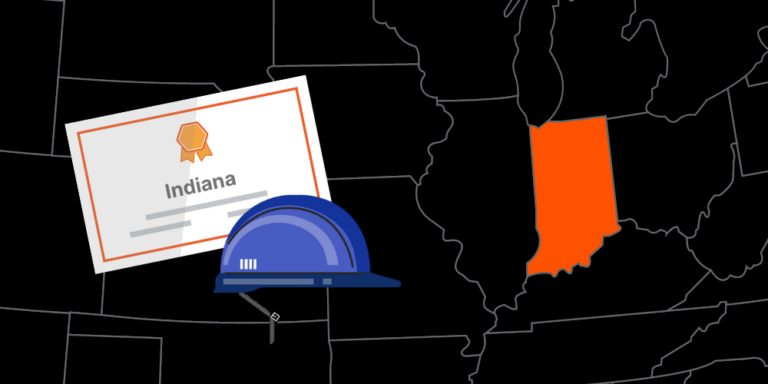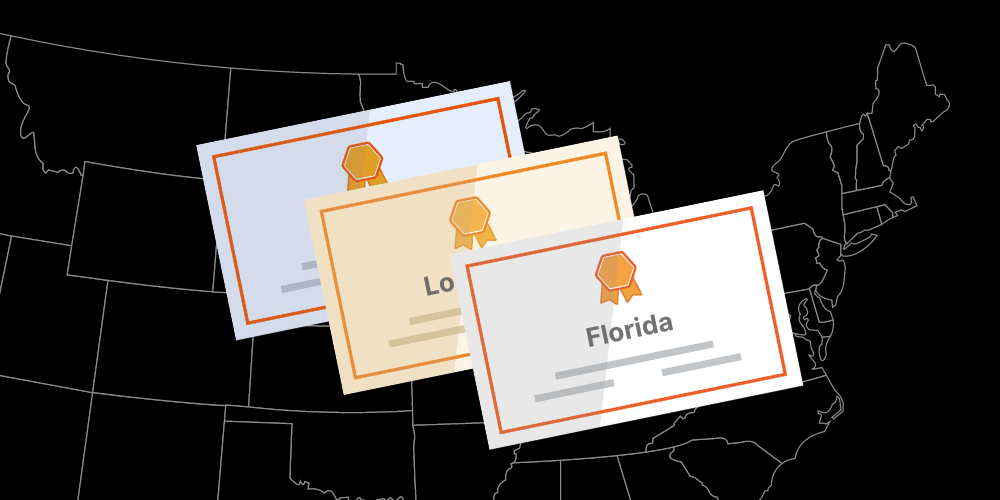— 8 min read
How to Get a Contractor License in Indiana
Last Updated Jun 11, 2024
Last Updated Jun 11, 2024

If you're starting a construction business in Indiana, you'll want to know that Indiana handles licensing differently than most other states. Instead of the state overseeing all the contractor licensing, the individual municipalities handle them. Generally speaking, this means contractors need to head to the seat of each county in which they plan to work. It’s up to those municipalities to determine who needs a license and who doesn’t.
The one exception to this rule is plumbing contractors. Other than that licensing is handled at the local level. The following sections will go over business licenses (which are different from contractor licenses), getting a plumbing license, and the routes to go for licensing in the most populated areas of the state.
Table of contents
How to get a contractor license in Indiana
To get a contractor license in Indiana, you'll need a business license as well as a license from the state or municipality, depending on your situation. The one state-issued contractor license is the plumbing contractor license.
Business license
Regardless of the type, all businesses in Indiana must register with the Indiana Secretary of State. Business owners can handle the entire process online. All that’s required to start registering is to head to the Secretary of State’s portal, create a login, and complete the registration application online.
State-issued plumbing contractor licenses
Plumbing contractors need to pursue licensing through the state. Licensing for plumbing contractors in the State of Indiana goes through the Indiana Professional Licensing Agency.
Licensing is relatively straightforward. Applicants will head to the state’s MyLicense portal and create a login. From there, the requirements for licensing are:
- Be 18 years or older
- Complete the online application
- Pay the application fee of $50 (credit or debit card for online applications, checks or money orders for mail-in applications)
- Fill out the appropriate section of the paper application:
The first four questions on the paper applications concern disciplinary actions, license denials, arrests, and conditional or impairments. If you answer “yes” to any of those questions, you’ll have to provide an affidavit detailing the situation, the outcome, the date of occurrence, malpractice details, and court documents or arrest records.
Stay updated on what’s happening in construction.
Subscribe to Blueprint, Procore’s free construction newsletter, to get content from industry experts delivered straight to your inbox.

Getting a contractor license in Indiana: Municipality-specific rules
Contractor licensing in Marion County, Indiana
Most of the licensing in Marion County goes through the consolidated City of Indianapolis Department of Business and Neighborhood Services. Indianapolis requires general contractors, electricians, HVAC, and many other contractors to carry licenses. All licenses require this application.
General contractors
General contractors planning to work in Marion County have some specific requirements to meet. They include:
- A license fee of $247, $185, or $124, depending on the time of year
- DBAs must register with the city prior to application
- Completed application signed by the sole proprietor, a partner, or an officer of the corporation
- General liability insurance certificate valued at:
- A surety bond certificate of at least $10,000 with “Consolidated City of Indianapolis and/or Unknown Third Party” as obligee
- Proof of workman’s compensation insurance or a waiver if you do not have employees
Electrical, HVAC, and wrecking contractors
Many of the requirements for electrical, HVACR, and wrecking contractors are the same as general contractors — with a few slight twists. The requirements are:
- Must employ one trade license holder who has taken the required examination and list them on the application
- Pay the license fee:
- DBAs must register with the city prior to application
- Completed application signed by the sole proprietor, a partner, or an office of the corporation
- General liability insurance certificate valued at:
- A surety bond certificate valued at:
Contractor licensing in Lake County, Indiana
Contractors who plan to work in Lake County, Indiana, will have to pursue licensing through the county government. Specifically, licensing is a function of the Planning Commission.
General contractors, electrical contractors, plumbing contractors (registration only), and HVAC contractors will apply for licensing using the online application. The requirements are relatively straightforward, including:
- Fill out the application completely, and submit it with a $300 licensing fee
- Attach two colored passport photos
- Notarized endorsements
- Pass the written examination with a score of 76 percent or better
The application requires:
- Applicant’s name
- Business name and address
- Federal Tax ID Number
- License type including specialty if applicable
- Proof of property and liability insurance policy with coverage of at least $500,000 or an umbrella policy worth $1,000,000
- A surety bond of at least $5,000
- Proof of workman’s compensation insurance
- Describe length of service in contracting business in Lake County, Indiana
- Two endorsements from residents of Lake County that can verify your work experience
Contractor licensing in Allen County, Indiana
Contractors working in Allen County will have to pursue licensing through the county Building Department. The county doesn’t make applications readily available online, but it does provide a 37-page copy of rules and regulations for download.
The Allen County Building Department requires several types of contractors to carry a license, and the department has several designations. It offers licenses for:
- General Contractors
- General Contractor Superintendent Registration (required to oversee a project)
- Building Contractors for commercial and multi-family builders
- Building Contractor Superintendent Registration (required to oversee a commercial project)
- Residential Contractor License
- Residential Contractor Superintendent Registration (required to oversee a residential project)
- Home Improvement Contractor License (repair, alteration, and improvement of one and two-family dwellings)
- Subcontractor Licenses:
- Electrical Contractors License
- Plumbing Contractor Registration
- HVAC and Duct System Contractors
The fees for each license type vary:
- General Contractor: $90
- General Contractor Superintendent: $25
- Building Contractor: $90
- Building Contractor Superintendent: $25
- Residential Contractor: $60
- Residential Contractor Superintendent: $25
- Home Improvement Contractor: $60
- Electrical Contractor: $90
- Plumbing Registration: $25
- HVAC Contractor: $90
Courses about construction.
For construction.
Unlock your career potential with our free educational courses on Health & Safety, Data in Construction, and more.
Contractor licensing in St. Joseph County, Indiana
Most contractors working in St. Joseph County, Indiana need to pursue a license. Since the City of South Bend, Indiana is the county seat, its Building Department oversees licensing within the county.
General contractors
General contractors will need to register as Building Contractors. They’ll use the online application, and the requirements are:
- Complete the Pre-Licensing Registration form in the application
- Carry a surety bond
- Proof of worker’s compensation insurance
- Register with the State of Indiana Secretary of State
- Pay a $125 annual fee
Electrical contractors
Electrical contractors have a choice between two license types: Class A and Class B. Class A would apply for typical electrical contractors, while Class B includes industrial electrical work. Requirements for both licenses are:
- Complete the online application and submit a photo ID
- Be at least 21 years old
- Provide a statement from a local Police Department indicating misdemeanor and felony convictions
- Have at least four years of experience in the installation, repair, and maintenance of residential, commercial, or industrial electrical wiring.
- Submit a letter of reference from each contractor on the application verifying apprenticeship
- Submit a $50 application fee
- Provide a surety bond
- Proof of worker’s compensation insurance
- Register with the State of Indiana Secretary of State
- Pay a $125 annual fee
HVAC Contractors
HVAC contractors have very similar requirements as electrical contractors, from the fees and experience down to the bond and the amount required. The forms are different, however, as HVAC contractors must use the online application.
Penalties for unlicensed contracting in Indiana
Since almost all the contractor licensing requirements in Indiana fall on individual municipalities, penalties for not playing by the rules vary. Each individual county or municipality can issue fines and penalties, as well as classify unlicensed contracting as a criminal act as they see fit.
There is a benefit of the state relegating control to the municipalities: Indiana's mechanics lien law makes no specific requirement for licensing in order to file a lien. With that said, it’s never a good idea to contract for work without a license if the local municipality requires one.
If you’re performing work without the proper license, you may be able to file the mechanics lien, but enforcing it could be an issue. If you have to take the case to court, it’s unlikely that the court will look fondly upon your licensing status. That could hurt your chances of recovering payment.
Was this article helpful?
Thank you for your submission.
100%
0%
You voted that this article was . Was this a mistake? If so, change your vote here.
Scroll less, learn more about construction.
Subscribe to The Blueprint, Procore’s construction newsletter, to get content from industry experts delivered straight to your inbox.
By clicking this button, you agree to our Privacy Notice and Terms of Service.
Categories:
Tags:
Written by
Tom Scalisi
57 articles
Tom Scalisi is a writer with over 15 years of experience in the trades. He is passionate about educating contractors and specialty contractors about the best practices in the industry. He has seen first-hand how education, communication, and preparation help construction professionals overcome challenges to build a strong career and thriving business in the industry.
View profileExplore more helpful resources

Contractor License Bonds: Everything You Need to Know
In order to perform construction work, many states require contractors to be “licensed and bonded.” What does that mean? Well, every state sets its own rules for contractor licensing, and...

Contractor’s Guide to License Reciprocity: Working Across State Lines
For many contractors, growing a construction business means taking on jobs in different states. Whether it’s to take a one-off project or to establish a new business location, working in...

Vermont Contractor License: Guide to Rules & Requirements
If you’re starting a construction business in Vermont or looking to expand your business from another state, being properly licensed to work is one of the first key steps. There...

The Maine Contractor License: Guide to Rules & Requirements
If you’re considering starting a contracting business in Maine, it’s important to know the rules and requirements for proper licensing. Maine takes a different approach to contractor licensing than most...